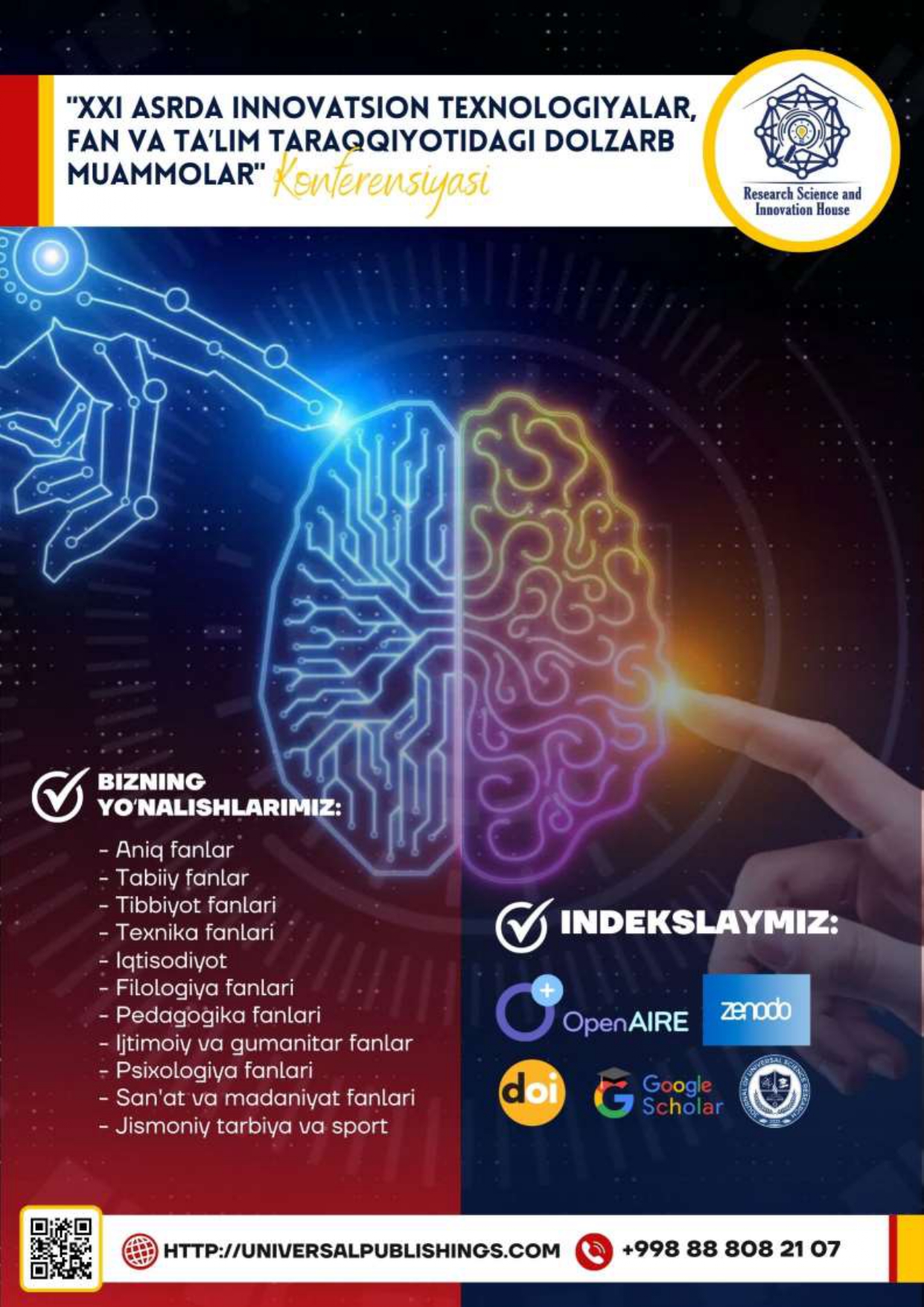Abstract
This article analyzes the prospects for learning foreign languages through modern technologies and artificial intelligence. With the development of artificial intelligence and technologies, new opportunities are emerging in the language learning process. The article compares traditional language learning methods with those facilitated by modern technologies, and also examines the role and significance of artificial intelligence in language acquisition.
References
1. Bai, X., & Shen, X. (2021). The Impact of Artificial Intelligence on language learning: A Comprehensive review. Journal of educational technology development and exchange, 14(1), 45-60.
2. Burston, J. (2014). MALL: The pedagogical challenges. Computer Assisted language learning, 27(4), 344-357.
3. Chiu, C.-H., & Liou, H.-C. (2020). a comparative study on the effects of different types of ai-assisted feedback on efl students' writing. Interactive learning environments, 28(3), 289-305.
4. Creswell, J. W. (2014). Research design: Qualitative, quantitative, and mixed methods approaches (4th ed.). Sage publications.
5. Dizon, G. (2016). Evaluating the use of mobile technology in second language classrooms: A Meta-Analysis. Language learning & technology, 20(3), 196-216.
6. Godwin-jones, R. (2015). Emerging technologies: The evolving roles of language teachers: Trained coders, local practice developers, call facilitators. Language learning & technology, 19(1), 10-22.
7. Guichon, N., & Hauck, M. (2011). Teacher education research in CALL and CMC: More in demand than ever. ReCALL, 23(3), 187-199.
8. Li, Y., & He, Q. (2017). Artificial intelligence and language learning: The state of the art. Journal of computer-assisted learning, 33(5), 451-464. 9. Lu, Z., & Hou, Y. (2020). The effectiveness of using AI in language learning: a meta- analysis of recent studies. International journal of artificial intelligence in education, 30(2), 131- 156.
10. Plass, J. L., & Jones, L. C. (2005). Multimedia learning in second language acquisition.
In R. E. Mayer (Ed.), The cambridge handbook of multimedia learning (pp. 467-488). Cambridge University Press.
11. Puentedura, R. R. (2013). SAMR and bloom's taxonomy: Assembling the puzzle.
Learning, education and technology.
XXI ASRDA INNOVATSION
TEXNOLOGIYALAR, FAN VA TA'LIM
TARAQQIYOTIDAGI DOLZARB MUAMMOLAR
Volume 02, Issue 12, 2024
85 XXI ASRDA INNOVATSION TEXNOLOGIYALAR, FAN VA TA'LIM TARAQQIYOTIDAGI DOLZARB MUAMMOLAR
12. Stockwell, G. (2012). Mobile-assisted language learning. In M. Thomas, H. Reinders, & M. Warschauer (Eds.), Contemporary computer-assisted language learning (pp. 201-216).
Bloomsbury academic.
13. Warschauer, M. (2013). Technological change and the future of CALL. Routledge.
14. Ziegler, N. (2016). Taking technology to task: Technology-mediated TBLT, performance, and production. Annual review of applied linguistics, 36, 136-163.
15. Zou, B., Li, H., & Li, J. (2018). Exploring the effects of artificial intelligence and virtual reality on language learning: A review. International journal of educational technology in higher education, 15(1), 20-32.
16. Qodirovna, A. Z., & Kamoljonovich, S. J. (2022). JK ROULINGNING, GARRI POTTER VA AFSUNGARLAR TOSHI’’ROMANIDAGI SEHRGARLAR OBRAZINI INGLIZ
TILIDAN O’ZBEK TILIGA TARJIMA QILISHNING LINGVO-PERSPEKTIV
TAHLILI. Central Asian Research Journal for Interdisciplinary Studies (CARJIS), 2(3), 176-180.
https://doi.org/10.24412/2181-2454-2022-3-176-180
17. Солижонов, Ж. (2024). Crafting the lexicon of magic: analyzing JK Rowling’s neologisms in translation. Зарубежная лингвистика и лингводидактика, 2(4/S), 34-38.
18. Kamoljonovich, S. J. R. (2024). AMALIY TARJIMA ELEMENTLARINING ZAMONAVIY KLASSIFIKATSIYASI.
19. Kamoljnovich, S. J. (2022). JK ROULINGNING FANTASTIK ASARLARIDAGI ANTROPONIMLARNING LINGVO-PERSPEKTIV MUAMMOLARI. Central Asian Research
Journal for Interdisciplinary Studies (CARJIS), 2(1), 334-343. https://doi.org/10.24412/2181-
2454-2022-1-334-343
20. Kamoljonovich, S. J., & O’G, Y. N. U. B. (2022). BADIIY TARJIMA UCHUN TARJIMA USULLARI TAHLILI (IAN TUHOVISKIY ASARLARI MISOLIDA). Ta’lim fidoyilari, 18(5), 32-37.
21. Jo’ramurodova, Z., & Solijonov, J. (2022, April). JK ROULINGNING “BIDL QISSANAVIS ERTAKLARI”(“THE TALES OF BEEDLE THE BARD”) ASARIDAGI
ANTROPONIMLARNING O’ZBEK TILIDAN INGLIZ TILIGA TARJIMA QILISHDAGI
MUAMMOLARI. In МЕЖДУНАРОДНАЯ НАУЧНАЯ КОНФЕРЕНЦИЯ:" СОВРЕМЕННЫЕ ФИЛОЛОГИЧЕСКИЕ ПАРАДИГМЫ: ВЗАИМОДЕЙСТВИЕ ТРАДИЦИЙ И ИННОВАЦИЙ
II" (Vol. 2, No. 18.03, pp. 554-560). https://doi.org/10.47100/nuu.v2i18.03.115

